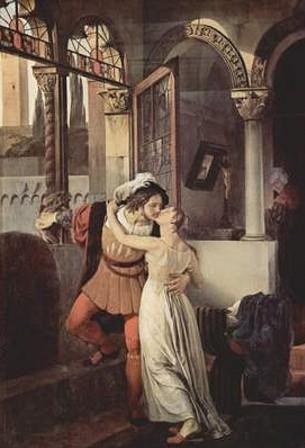This is a richly imagined and deeply researched historical
novel, set in Europe's late Middle Ages, and told in a lilting narrative
voice. The narrator is the title's
Juliet's nurse, Angelica, the wet-nurse to the young Juliet Cappelletti, the
daughter of a wealthy citizen of Verona, Italy.
A wet-nurse was often hired for the children of wealthy men
in that era, so their wives could return to normal fertility as quickly as
possible, and produce more heirs. Wives
were, for most wealthy men, no more than playthings and breeders.
If Juliet's name sounds familiar, it is because she is
Shakespeare's Juliet, from his famous play, Romeo and Juliet. The author of Juliet's Nurse has imagined the
life of Juliet's nurse, an often comic character in the play, and certainly a
woman of low birth.
When the woman's difficult life is imagined and told in the
first-person, however, we get to meet a real woman who has suffered not just
hardship, misogynistic persecution and starvation, but the loss of all her
children to disease.
Because our narrator is a servant from a working class we
get an insight into what life was like for the working poor of that era. But the servant, Angelica, works in the home
of one of Verona's wealthiest families, so we get an insight into the lives of
the rich, too.
The low stature of women, and the sexual use of young girls
that was common during Europe's Middle Ages is striking to our modern
sensibilities, but it would be familiar to anyone living in modern Afghanistan.
Enlightened thought, and medical proof that early
pregnancies and continual pregnancies can kill young women are as lacking in
some of today's societies as it was in Medieval Europe, despite the proof they
witnessed every day. Women were considered
expendable.
The book is divided into two parts:
- Part One - 1360 - 1363
Angelica joins the Cappelletti family to wet-nurse the new-born Juliet
- Part Two - 1374
-1375 Angelina continues to care
for Juliet as the child grows into puberty
Here is the narrator ruminating on thoughts that come to
mind when talking with the child, Tybalt, Juliet's young cousin, another
character from Shakespeare's play, for the author imagines not just the lives
of Angelica, but of all the characters from the play:
How much easier it is to be poor than rich. We are too busy scrambling to find enough to
eat each day to worry ourselves over the centuries' worth of slaughtering that
consumes a boy like Tybalt, who chews thick slices from the pear as he schools
me about his esteemed relations. His
father is Giaccomo, and Juliet's is Leonardo, and they are brothers. Very cunning, very courageous, and very rich,
ever plotting against anyone who dishonors their nobel family. Just like all the Cappelletti who came before
them. When I ask which man is the elder,
Tybalt laughs and tells me they are too old for anyone to remember. From this I figure that his father must be
the younger, for an older brother never fails to impress his son about his
rightful place in the family line.
Shakespeare's Garden - Flowers From the Plays
All the characters from Shakespeare's play are present, as
children and later as young men and women, or as adults and later as older adults.
You don't need to know the play well to appreciate this book, but if you
are familiar with it, then you may get greater pleasure from this re-imagining
of the story.
There is much history for the lovers of historical fiction
to relish: herbs, medicines, customs,
food, sweets, houses, décor. The
author's research has been extensive.
But it does not weigh down the story.
Instead, it adds credibility to the tale.
Here is a lovely part where the narrator describes her first view of Verona
from on high, from a tower that is part of the Cappelletti family's home:
I know Verona as I do my own body. Every labyrinthed passage and each loose
paving stone among my parish streets.
The smell of tanneries, of public ovens, and of offal-piles. The snorting hogs upon the piazza, and the
rush of the Adige beneath the bridges.
But I've never imagined this:
that I could stand as tall as the church campaniles, watching the city's
roof tiles glint in the sun, the people and animals moving between them as
small as crawling insects. The world
spreading beneath me glows with the sublime beauty you see in painting of the
Annunciation.
There are some twists and surprises along the way, in the
story, but I won't spoil them for you. The book is well-written and well-edited, and I'm glad I requested a review copy. It has a striking cover. Juliet's Nurse is a quality production, with an attractive interior design that features illuminated first letters of each chapter, in the style of the era in which it is set.
I
would have enjoyed more dialog, instead of Angelica's summaries of what people
have said. And some suggestion as to how
illiterate Angelica's story came to be told would have been fun. But on the whole, this was a read that took
me away from the world around me and immersed me in a past that seemed a bit
familiar, due to the characters I knew from the play. I enjoyed it!
From the book's description:
An enthralling new telling of Shakespeare’s Romeo and
Juliet—told from the perspective of Juliet’s nurse.
In Verona, a city ravaged by plague and political rivalries, a mother mourning
the death of her day-old infant enters the household of the powerful
Cappelletti family to become the wet-nurse to their newborn baby. As she serves her beloved Juliet over the next
fourteen years, the nurse learns the Cappellettis’ darkest secrets. Those secrets—and the nurse’s deep personal
grief—erupt across five momentous days of love and loss that destroy a
daughter, and a family.
By turns sensual, tragic, and comic, Juliet’s Nurse gives voice to one of
literature’s most memorable and distinctive characters, a woman who was both
insider and outsider among Verona’s wealthy ruling class. Exploring the romance and intrigue of
interwoven loyalties, rivalries, jealousies, and losses only hinted at in
Shakespeare’s play, this is a never-before-heard tale of the deepest love in
Verona—the love between a grieving woman and the precious child of her heart.
In the tradition of Sarah Dunant, Philippa Gregory, and Geraldine Brooks,
Juliet’s Nurse is a rich prequel that re-imagines the world’s most cherished
tale of love and loss, suffering and survival.

Juliet's Nurse is published by
EmilyBestler Books, and imprint of Atria Books, which is an imprint of Simon and Schuster.
Emily Bestler founded her eponymous imprint, Emily Bestler Books, in 2011 with one guiding principle: to find the very best commercial fiction and nonfiction across a wide range of categories and put these books into the hands of as many readers as possible. In her words, “We are passionate about our mission of finding a book for everyone. You’ll find that our list is as varied as our readers.”
Here is a direct link to the book at Amazon.com:




























